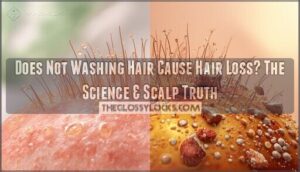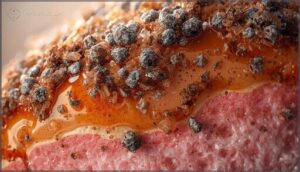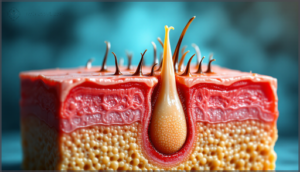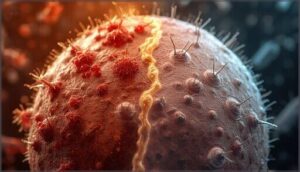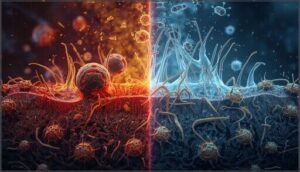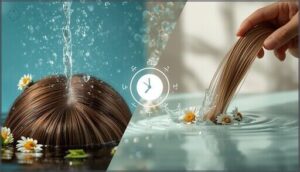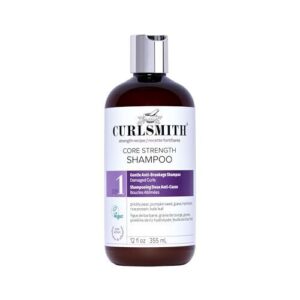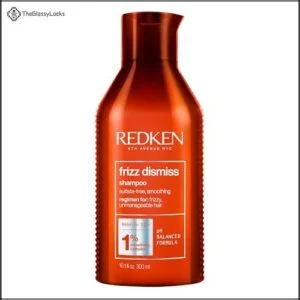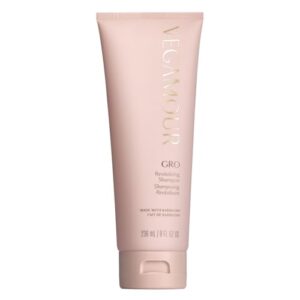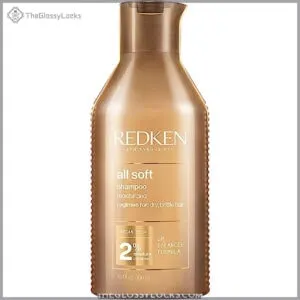This site is supported by our readers. We may earn a commission, at no cost to you, if you purchase through links.
You’ve probably heard the warnings: skip too many washes and your hair will fall out in clumps. This anxiety drives countless people to shampoo daily, even when their scalp protests with dryness and irritation.
The truth cuts through this fear—not washing your hair won’t cause permanent hair loss, but it creates conditions on your scalp that trigger shedding in ways you might not expect. Your scalp is a living ecosystem, and when oil, sweat, and environmental debris accumulate, they don’t just sit there harmlessly. They disrupt follicle function, invite inflammation, and push healthy hair into premature shedding phases.
The real question isn’t whether skipping washes destroys your follicles—it’s understanding how your unique scalp reacts to buildup and finding the washing rhythm that keeps both your hair and scalp thriving.
Table Of Contents
- Key Takeaways
- Does Not Washing Hair Cause Hair Loss?
- Impact of Oil and Dirt Buildup on Hair
- Scalp Health and Hair Loss Risks
- Hair Washing Frequency: What’s Optimal?
- Top Shampoos for Healthy Hair and Scalp
- Frequently Asked Questions (FAQs)
- Does washing hair with hot water affect its health?
- What happens if you don’t wash your hair?
- Will not washing my hair stop my hair from falling out?
- What happens if you don’t wash your hair for 3 weeks?
- Does a low wash frequency cause hair loss?
- Do you lose more hair when you don’t wash it?
- Will not washing your hair cause it to fall out?
- How often should I wash my hair for hair loss?
- Can a dirty scalp cause hair loss?
- Can stress from work affect hair washing routine?
- Conclusion
Key Takeaways
- Skipping hair washes doesn’t directly destroy follicles, but the accumulation of sebum, pollutants, and debris creates scalp inflammation and follicle dysfunction that triggers premature shedding and can lead to temporary hair thinning over time.
- Research shows that washing less than once weekly correlates with the highest perceived hair loss, while daily washing produces the lowest shedding rates—suggesting that regular cleansing prevents the buildup that disrupts healthy hair growth cycles.
- Scalp conditions like seborrheic dermatitis, folliculitis, and Malassezia yeast overgrowth thrive in unwashed environments, releasing inflammatory cytokines that weaken follicles, shorten growth phases, and accelerate hair loss beyond normal daily shedding of 50-100 strands.
- Your optimal washing frequency depends on individual factors including scalp oil production, hair type, lifestyle, and climate—with oily scalps requiring daily or every-other-day cleansing while dry or curly hair benefits from washing one to two times weekly to maintain both scalp health and hair integrity.
Does Not Washing Hair Cause Hair Loss?
You’ve probably heard conflicting claims about whether skipping shampoo actually causes hair loss, and the answer isn’t as simple as you might think.
The same complexity applies to specific brands—whether L’Oréal shampoo causes hair loss depends entirely on your scalp’s reaction to its particular formula.
The truth is, not washing your hair doesn’t directly kill hair follicles, but it can create scalp conditions that lead to thinning and shedding over time.
Let’s break down what the science actually says about this common hair care myth.
Debunking The Hair Washing Myth
Does washing your hair daily trigger hair loss? Contrary to popular Hair Care Myths, daily washing doesn’t cause permanent hair loss for most people. In fact, Wash Frequency matters less than Scalp Health.
- Daily cleansing can reduce irritant buildup
- Suitable shampoos protect follicles during washing
- Hair shedding links more to genetics than Hair Washing habits
- Tailoring your Hair Care Routine to scalp type improves outcomes
- Overwashing may irritate but won’t damage follicles permanently
Research highlights the importance of maintaining a balanced scalp environment for healthy hair growth.
Scientific Evidence on Wash Frequency and Hair Loss
Hair Loss Studies reveal that low Wash Frequency correlates with increased shedding, while Dermatological Research confirms daily Washing Hair results in the lowest perceived Hair Loss.
Scalp Analysis shows participants washing less than once weekly report the highest hair fall, suggesting that infrequent cleansing compromises Scalp Health.
Hair Growth Patterns improve when you maintain regular washing, as buildup disrupts follicle function and Hair Growth. Understanding the relationship between scalp health and washing habits can help inform healthier hair care routines.
Hair Training Trends Vs. Medical Facts
Popular trends promise dramatic results from extreme wash schedules, but Dermatology Insights and Trichology Research tell a different story. Your Hair Biology operates on genetics and Hair Follicles, not wishful thinking about training. While adjusting routines may suit personal Scalp Hygiene needs, medical facts show that Scalp Health drives outcomes, not trendy extremes.
- Hair Growth stays limited by follicles, regardless of washing habits
- Customized routines improve comfort but don’t override Hair Loss Causes
- Scalp Hygiene practices influence cleanliness more than preventing shedding
Impact of Oil and Dirt Buildup on Hair
When you skip washing your hair, you’re not just leaving yesterday’s oil behind—you’re creating a perfect storm of sebum, pollutants, and debris that can wreak havoc on your scalp.
This buildup doesn’t just sit there looking greasy; it actively interferes with your follicles and creates an environment where problems thrive.
Here’s what’s actually happening on your scalp when oil and dirt accumulate.
Understanding what causes an oily scalp helps you tackle the problem at its source instead of just masking symptoms.
How Sebum and Pollutants Affect The Scalp
Your scalp faces a hidden battle every day. Sebum mixes with environmental pollutants to create a sticky film that traps dirt and dead skin cells, disrupting your scalp microbiome and triggering oxidative stress.
This buildup doesn’t just affect oil balance—it damages barrier function, reduces oxygen delivery to hair follicles, and sets the stage for inflammation that can compromise scalp health and contribute to hair loss.
Scalp buildup doesn’t just look greasy—it starves follicles of oxygen and triggers the inflammation that leads to hair loss
Follicle Clogging and Hair Shedding
Clogged pores don’t just sit on your scalp—they actively disrupt follicle health and trigger hair shedding. When sebum buildup combines with dead skin cells, you’re creating plugs that block the follicular opening, trap emerging hair shafts, and fuel scalp irritation that shortens your hair’s growth phase.
Here’s how follicle blockage leads to hair loss:
- Oil and debris form physical barriers around follicles, slowing hair shaft emergence
- Trapped sebum shifts your scalp’s bacteria balance, increasing inflammation
- Persistent blockage can miniaturize follicles over time if left unaddressed
- Localized irritation disrupts normal hair cycling, pushing more strands into shedding phase
Scalp Infections Linked to Infrequent Washing
Skipping shampoo repeatedly creates conditions for bacterial colonization and fungal overgrowth, setting the stage for scalp infection, folliculitis risk, and yeast infections like Malassezia-driven dandruff.
When oil accumulates, you’re basically feeding microbes that disrupt scalp health, trigger scalp irritation, and worsen seborrheic dermatitis—all of which can accelerate hair loss if inflammation persists unchecked.
Scalp Health and Hair Loss Risks
When you skip washing your hair regularly, you’re not just dealing with grease—you’re creating conditions that can genuinely harm your scalp and trigger hair loss. The buildup we talked about earlier sets off a chain reaction of inflammation, irritation, and even infection that weakens your hair at the root.
Let’s look at three specific ways poor scalp health translates directly into thinning hair.
Seborrheic Dermatitis and Hair Thinning
When you notice flakes and redness, your hair follicle health may already be at risk. Seborrheic dermatitis triggers scalp inflammation that weakens follicles and disrupts your normal growth cycle, leading to temporary hair thinning and increased shedding.
This common condition creates an oily environment where Malassezia yeast thrives, feeding on excess sebum and irritating follicles until you start proper dermatitis treatment to restore scalp health.
Inflammation and Its Role in Hair Loss
Inflammation doesn’t just irritate your scalp—it actively disrupts the hair growth cycle by releasing inflammatory cytokines like interleukin-1 beta and tumor necrosis factor alpha that stress follicles and trigger premature shedding.
When your immune response mistakenly targets follicle structures, you’re dealing with follicle inflammation that thins hair shafts, shortens growth phases, and creates the perfect storm for progressive hair loss alongside seborrheic dermatitis and other scalp conditions.
Scratching, Irritation, and Hair Fall
When itching strikes, scratching feels like instant relief—but it’s a trap that physically damages hair follicles and accelerates shedding through chronic scalp inflammation.
- Repeated scratching weakens the hair cuticle, causing breakage and triggering itch management challenges linked to seborrheic dermatitis and dandruff
- Intense scratching inflames follicles, shortening growth phases and worsening scalp conditions
- Micro wounds from scratching invite bacterial infections that compound hair loss
- Effective irritation control and scratch prevention restore scalp health and stop the itch-scratch cycle
Hair Washing Frequency: What’s Optimal?
You’ve heard conflicting advice about how often to wash your hair, and the confusion is understandable when everyone from your hairstylist to Instagram influencers weighs in. The truth is, there’s no universal answer that works for everyone, but research does point to some general principles based on scalp health and hair loss prevention.
Your ideal washing frequency depends on several factors, from your hair type to your lifestyle, and getting it wrong in either direction can create problems.
How Often Should You Wash for Healthy Hair?
Your hair washing frequency depends on your scalp type and lifestyle. For oily scalps, daily or every-other-day washing helps manage oil and maintain scalp health.
If you have dry or curly hair, washing one to two times weekly preserves moisture and reduces frizz.
A moderate approach prevents buildup without stripping natural oils, supporting healthy hair habits and ideal scalp care.
Factors Influencing Ideal Wash Frequency
Beyond your baseline scalp type, several factors shape your hair washing frequency. Seasonal changes can shift scalp pH balance and oil production, while water quality affects product buildup and hair porosity. Consider these elements for ideal scalp health:
- Urban pollution increases particle accumulation, requiring more frequent washes
- Exercise routines increase sweat and oil, justifying shorter intervals
- Styling products leave residues that demand periodic cleansing
- Humid climates accelerate oiliness and impact hair care and maintenance
- Color-treated hair may need adjusted frequency to prevent dullness
Consequences of Washing Too Little or Too Much
Finding the sweet spot matters because extremes at either end of wash frequency can backfire. Under-washing leads to oil buildup, scalp irritation, and potential hair loss from inflammation, while over-washing strips protective lipids and may cause dryness, scalp irritation, and hair breakage.
Your hair texture and scalp health guide the right balance, so listen to your body—itchiness or dullness signals you’re off track.
Top Shampoos for Healthy Hair and Scalp
You’ve learned that consistent washing protects your scalp from the buildup that triggers inflammation and hair loss. Now, choosing the right shampoo becomes essential, because not all formulations address the specific needs of your hair type and scalp condition.
Here are four dermatologist-recommended shampoos that support scalp health while targeting common hair concerns.
1. Curlsmith Strengthening Shampoo for Curly Hair
For curls that need both gentle care and structural support, Curlsmith Core Strength Shampoo delivers protein-based reinforcement without harsh sulfates. Hydrolyzed rice protein and hemp seed protein work to reduce breakage while maintaining your scalp’s natural moisture balance.
The formula suits all curl types, particularly damaged patterns, and won’t strip color or cause protein overload when used regularly. At $26 for 12 ounces, it’s pricier than drugstore options, but the sulfate-free approach helps preserve both follicle health and curl definition.
| Best For | People with damaged or weakened curls who want a protein boost without sulfates stripping their hair. |
|---|---|
| Hair Type | Curly/Damaged |
| Form | Liquid |
| Scent | Strawberry/Vanilla |
| Size | 12 oz |
| Color-Safe | Yes |
| Price | $26.00 |
| Additional Features |
|
- Rice and hemp proteins strengthen hair and cut down on breakage
- Sulfate-free formula keeps curls soft and doesn’t mess with color
- Works for all curl types, from loose waves to tight coils
- Can dry out hair if you skip a good conditioner afterward
- $26 for 12 oz is steep compared to drugstore shampoos
- Lather isn’t as foamy as other options, which some people miss
2. Redken Frizz Dismiss Shampoo
If frizz rather than curl definition is your main concern, Redken Frizz Dismiss Shampoo targets humidity-induced flyaways with babassu oil and a sulfate-free base.
The smoothing complex seals cuticles to reduce static, making it effective for color-treated hair that needs gentle cleansing without harsh stripping agents.
At roughly $18 for 10.1 ounces, it’s a mid-range option, though some users report buildup over time or an unexpected waxy texture that may require occasional clarifying washes for ideal scalp health.
| Best For | Color-treated or highlighted hair that needs gentle frizz control and humidity protection without sulfates. |
|---|---|
| Hair Type | Frizzy |
| Form | Liquid |
| Scent | Unscented |
| Size | 12.01 oz |
| Color-Safe | Yes |
| Price | Not specified |
| Additional Features |
|
- Sulfate-free formula won’t strip color while smoothing frizzy hair
- Babassu oil adds moisture and creates a protective barrier against humidity
- Increases shine and manageability for daily use
- Can cause scalp buildup over time, requiring occasional clarifying treatment
- Some users find it leaves a waxy or slimy texture on hair
- Pricier than drugstore alternatives at around $18 for 10.1 ounces
3. Vegamour Gro Revitalizing Hair Shampoo
For thinning hair that needs a scalp-friendly boost, Vegamour Gro Revitalizing Shampoo combines biomimetic peptides, caffeine, and biotin to nourish follicles without disrupting your scalp’s natural balance.
The vegan keratin alternative, Karmatin, repairs damage while the formula cleanses gently enough for daily use, making it color-safe and free of sulfates or silicones.
At $48 for 8 ounces, it’s pricey, and some users find the watery texture tricky to manage, but consistent use may support a fuller appearance over three to four months.
| Best For | People with thinning hair or sensitive scalps who want a clean, vegan formula that supports density and reduces shedding over time. |
|---|---|
| Hair Type | All Hair Types |
| Form | Liquid |
| Scent | Natural Citrus |
| Size | 8 fl oz |
| Color-Safe | Yes |
| Price | $48.00 |
| Additional Features |
|
- Gentle, sulfate-free formula that’s safe for color-treated hair and daily use
- Contains hair-supporting ingredients like biotin, caffeine, and vegan keratin alternative
- Free of harsh chemicals, parabens, and synthetic fragrances
- Expensive at $48 for only 8 ounces
- Watery texture can make it difficult to dispense without spilling
- Results take 3-4 months of consistent use, and some users see increased hair fall instead
4. Redken All Soft Shampoo
If your scalp is perpetually dry and your hair feels brittle at the ends, Redken All Soft Shampoo offers moisture without leaving you greasy. The argan oil and soy protein formula softens coarse or parched hair, making detangling less of a wrestling match.
It’s gentle enough for daily washing, which keeps follicles clear and healthy. Though at around $20 for 10 ounces, you’re paying for the results—improved manageability and a smoother texture after consistent use.
| Best For | People with dry, brittle, or color-treated hair who need serious hydration without the heavy, greasy feeling. |
|---|---|
| Hair Type | Dry/Brittle |
| Form | Cream |
| Scent | Argan Oil |
| Size | 10.1 fl oz |
| Color-Safe | Yes |
| Price | Not specified |
| Additional Features |
|
- Argan oil and soy protein formula deeply moisturizes and softens coarse, parched hair
- Gentle enough for daily use and safe for color-treated hair
- Makes detangling easier and improves overall manageability
- Pricey at around $20 for just 10 ounces
- Not ideal for oily hair types or anyone looking for added volume
- The argan oil scent is pretty subtle, so don’t expect a strong fragrance
Frequently Asked Questions (FAQs)
Does washing hair with hot water affect its health?
Yes, very hot water strips natural oils and raises cuticles, causing dryness, frizz, and breakage. Warm water cleanses effectively without damage, while a cool rinse seals cuticles for healthier strands.
What happens if you don’t wash your hair?
Imagine a month without shampooing: your scalp becomes a sticky trap for sweat, dust, and dead skin.
Sebum combines with pollutants, creating buildup that triggers itching, flaking, and potential infections like seborrheic dermatitis.
Will not washing my hair stop my hair from falling out?
Not washing won’t reduce shedding—hairs fall at the same rate, whether you cleanse or skip. Washing simply removes strands already detached from follicles, so skipping doesn’t stop loss.
What happens if you don’t wash your hair for 3 weeks?
Like a dial-up internet connection gone stale, your scalp accumulates heavy sebum, dirt, and bacteria. You’ll likely notice increased itching, stronger odor, and potential irritation—though permanent hair loss isn’t typical for most people.
Does a low wash frequency cause hair loss?
Research shows that washing less than once a week is linked to higher perceived hair loss. Low wash frequency allows sebum and pollutants to accumulate, which can irritate your scalp and contribute to shedding.
Do you lose more hair when you don’t wash it?
You don’t lose more hair when you skip washing—your normal daily shedding of 50 to 100 hairs simply accumulates on your scalp, making it appear more dramatic when you finally cleanse.
Will not washing your hair cause it to fall out?
Your hair won’t fall out from skipping washes, but chronic neglect creates scalp buildup, inflammation, and irritation that can trigger shedding, making visible loss more noticeable during your next cleansing.
How often should I wash my hair for hair loss?
You’ll want to shampoo every one to three days, adjusting for your scalp type and activity level—oily scalps and frequent workouts often call for daily cleansing to prevent buildup.
Can a dirty scalp cause hair loss?
Yes. Debris, dandruff, and dirt create a congested environment that clogs follicles, triggers inflammation, and fuels microbial overgrowth—especially yeast like Malassezia—pushing more hairs into shedding phase and weakening new growth.
Can stress from work affect hair washing routine?
Work stress can disrupt your hair care routine, causing you to skip or rush washing sessions due to fatigue, tight deadlines, and feeling overwhelmed, which may compromise scalp health over time.
Conclusion
Doesn’t washing hair cause hair loss? Not directly—but the buildup, inflammation, and infections that follow infrequent washing absolutely can.
Your scalp’s needs aren’t fixed by trends or myths; they’re dictated by your oil production, lifestyle, and hair type. Listen to what your scalp tells you through itching, flaking, or excessive shedding.
Find your rhythm, choose products that support follicle health, and remember: clean scalps create the foundation for hair that stays rooted, strong, and thriving.
- https://www.ncbi.nlm.nih.gov/pmc/articles/PMC6369642/
- https://www.euromedclinicdubai.com/doctors/dr-fariha-anwar/
- https://www.scirp.org/(S(vtj3fa45qm1ean45vvffcz55))/reference/ReferencesPapers.aspx?ReferenceID=688812
- https://www.aad.org/public/diseases/hair-loss/insider/shedding
- https://www.healthline.com/health/scalp-build-up

